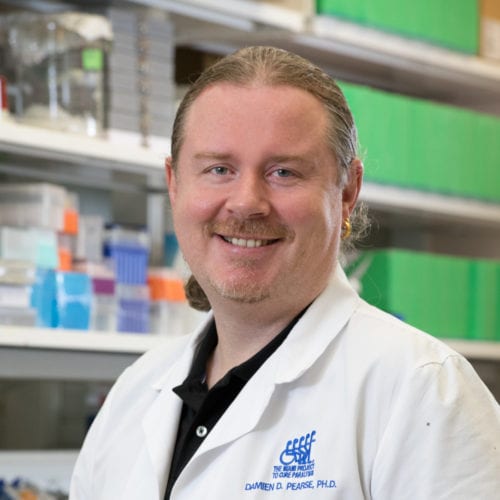Damien D. Pearse, Ph.D.
Professor, Department of Neurological Surgery
The John M. and Jocelyn H.K. Watkins Distinguished Chair in Cell Therapies
The Neuroscience Program, The Interdisciplinary Stem Cell Institute

The Miami Project to Cure Paralysis
1095 NW 14th Terrace (R-48)
Miami, FL 33136
Research Interests
Areas Of Research
Publications
More
Repairing the Injured Nervous System with Cell-Based Approaches and Modulators of Protein Modification Pathways
Dr. Pearse’s laboratory has been interested in the development and translation of autologous cell therapies for self-repair of the injured or diseased nervous system. Among these approaches, the use of Schwann cells has advanced from benchtop research to clinical trials for peripheral and central nervous system conditions, including spinal cord injury. Research work conducted by Dr. Pearse’s group have shown that the reparative efficacy of Schwann cells can be enhanced when they are used in conjunction with other glial cells such as olfactory ensheathing cells, are accompanied by the elevation of cyclic AMP, employed with biomaterials and matrices, modified with gene therapeutic delivery of growth factors or polysialic acid, among other combinatory strategies. More recently, research endeavors in the Pearse Lab are examining the utility of cell-derived extracellular vesicles in mediating protection and neurorepair of the injured or diseased nervous system. EVs can be employed to deliver both endogenous and synthetic cargoes including microRNAs, proteins, and pharmaceuticals as well as used for diagnostic tools, opening doors to early disease detection and personalized medicine.
The Pearse laboratory is also working on post-translational protein modifications including arginylation, transamidation and phosphorylation. Ongoing studies seek to decipher how these modifications influence neural cell responses to injury and disease and develop gene or pharmacological-based approaches that have the potential to steer these responses from deleterious trajectories toward more beneficial outcomes.
My laboratory focuses on several key aspects of nervous system protection and repair:
- Understanding the role of ATE1 and protein arginylation in neuronal cell death and abortive axon regeneration in CNS injury and disease.
- Investigating the utility of human stem and Schwann cell-derived exosomes as neuroprotectants and neuroplastic biological therapeutics.
- Delineating the cell specific role of TG2 in neurological disease and neurotrauma.
- The development of combinatory therapies employing autologous cell-based approaches and smart peptide gel biomaterials for repair of the injured nervous system.
- Exploring the role of cyclic AMP-dependent phosphodiesterases in aberrant neural cell responses to injury and designing therapies that collectively target cyclic AMP and mitogen activated kinase signaling pathways for regeneration and repair.
Visit Dr. Pearse’s Publication Listing
News Stories
Researching Regeneration: Dr. Damien Pearse Pursues Innovative Treatments for Spinal Cord Injury (March 2025)
Exosomes Show Promise as a Potential SCI Strategy (June 2020)
Reducing Damage After Spinal Cord Injury (Fall 2017)
Schwann Cell Safety Trial Completed (March 2017)
Damien D. Pearse, Ph.D. Installed as the John M. and Jocelyn H.K. Watkins Distinguished Chair in Cell Therapies (February 2016)
PROFESSIONAL AFFILIATIONS/MEMBERSHIPS
American Society for Neural Transplantation and Repair (ASNTR)
International Society of Neuroimmunology (ISNI)
CURRENT LAB PROJECTS
My laboratory focuses on several key aspects of nervous system protection and repair:
- Understanding the role of ATE1 and protein arginylation in neuronal cell death and abortive axon regeneration in CNS injury and disease.
- Investigating the utility of human stem and Schwann cell-derived exosomes as neuroprotectants and neuroplastic biological therapeutics.
- Delineating the cell specific role of TG2 in neurological disease and neurotrauma.
- The development of combinatory therapies employing autologous cell-based approaches and smart peptide gel biomaterials for repair of the injured nervous system.
- Exploring the role of cyclic AMP-dependent phosphodiesterases in aberrant neural cell responses to injury and designing therapies that collectively target cyclic AMP and mitogen activated kinase signaling pathways for regeneration and repair.
CURRENT LAB MEMBERS
Scott Airey (Research Associate 1)
Alessandra Degiorgio (Undergraduate Student)
Eric Patino (Research Associate 1)
Matthew Pisinski (Undergraduate Student)
Christian Romero (Research Associate 3)
Nikitas Thireos (Undergraduate Student)
